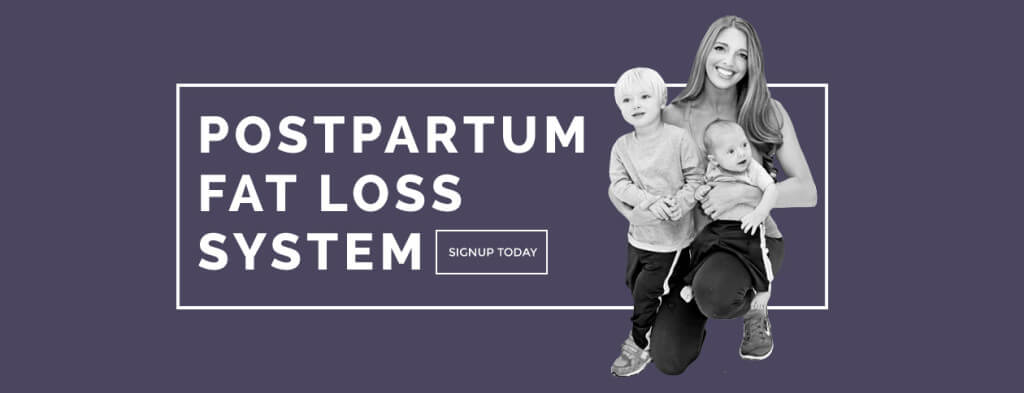How to Lose Baby Weight: Hormone Imbalance Symptoms
Last week we talked about how to lose baby weight and the 4 keys to getting your body back.
You learned the importance of healing and rebuilding abdominal separation (how to fix diastasis recti). Additionally, you got a glimpse at what proper postpartum training and nutrition should look like. (Hint: pick weights over cardio and ditch the crazy diet!)
We also talked about balancing metabolic/postpartum hormones.
If you’re training right (this means efficient, effective workouts–not hours killing yourself on the treadmill) and your nutrition is on point, but you’re still not seeing progress, this post is for you.
Many women come to me wondering how to lose baby weight. They ask WHY they still aren’t making progress after all of their hard work and healthy eating. My answer is always the same: “We need to fix your fat-fighting hormones.”
The key to sustainable fat loss comes in both a caloric deficit (that is, burning more calories than you consume) AND balanced metabolic hormones. But for new moms who are breastfeeding and can’t sustain a significant caloric deficit, the hormonal balance becomes even more important.
Hormone Imbalance Symptoms
When young moms hear the word “hormones” they immediately think of menopausal women and assume that hormone imbalances are not something they have to worry about.
However, the truth is hormonal changes affect everyone at every age. Our hormones are always changing!
Factors like lifestyle, sleep, stress, training, nutrition, even pollution and toxins can impact your hormones. And if you’re a new mom who is wondering how to lose baby weight, hormones are something you need to consider during your weight loss journey. Just think of all the hormonal changes that your body went through during pregnancy (hello mood swings, cravings, acne and more!). You have to balance those hormones back out!
Now that you’re postpartum, your body is continuing to change and it takes your hormones some time to catch up. For most moms, hormones return to normal (or at least close to normal) after weaning your baby. For some moms, this hormonal balance happens earlier. Others take a few months longer. And some moms aren’t able to get their body to return to a state of balance on their own.
4 Key Hormone Imbalance Symptoms:
1. Trouble Losing Baby Weight
As we talked about last week, calories in vs. calories out is NOT the whole picture when it comes to figuring out how to lose baby weight. I have seen many moms who are consistent with their workouts and make extremely healthy food choices but just can’t seem to lose the last 5lbs. It’s not uncommon for moms, whether baby is five months old or five years old, to have underlying hormonal imbalances that make it difficult to lose weight.
Insulin Resistance
Insulin resistance, whether diagnosed or not, is one of the MAIN reasons moms have trouble figuring out how to lose baby weight. When you’re pregnant, your placenta supplies nutrients and water to your growing baby. The placenta is also responsible for making a variety of hormones that are vital to maintaining a healthy pregnancy.
In early pregnancy, hormones can cause increased insulin secretion and decreased glucose production by the liver, which can lead to hypoglycemia (low blood glucose levels).
Later in pregnancy, some of these hormones (estrogen, cortisol, and human placental lactogen) can have a blocking effect on insulin, causing a condition called insulin resistance.
As the placenta grows, more of these hormones are produced, and insulin resistance becomes greater.
Normally, the pancreas is able to make additional insulin to overcome insulin resistance, but when the production of insulin is not enough to overcome the effect of the placental hormones, gestational diabetes results or there may be worsening of pregestational diabetes. Often times this condition does not return to normal after pregnancy, making it difficult (sometimes impossible) to lose baby weight until the hormonal issues are addressed.
If you suspect you have some form of insulin resistance, click here to read more:
2. Increase in Belly Fat and/or Loss of Muscle Mass

When your body is under stress, whether perceived stress (like the transition of living life with a newborn) or physiological stress (like lack of sleep), your body naturally produces less of certain hormones and produces more of other hormones. The main hormone you produce more of during postpartum is cortisol. Cortisol and its fellow “stress” hormones (epinephrine and norepinephrine) are produced in the adrenal glands.
The Science of Stress
When you first become stressed, your body releases these “stress” hormones. Epinephrine relaxes the muscles in your intestines and decreases blood flow to your stomach (hello, belly bloat). Norepinephrine tells your body to stop producing insulin so that fast-acting blood glucose is ready for use.
When you and your body have calmed back down and the stress is over, cortisol tells your body to stop producing epinephrine and norepinephrine, and to go back to breaking down food and digesting regularly. It’s not uncommon for cortisol levels to go up and down throughout the day, like when you wake up or workout, but the issues arise when you suffer from chronic stress, like weeks and weeks with limited sleep. Chronic stress causes cortisol levels to elevate and never return to a normal state.
The Culprit: Cortisol
Increases in belly fat and possible loss of muscle mass are two imbalance symptoms attributed to an imbalance of cortisol. When cortisol levels are high for long periods of time, your body can store food as fat and refuse to burn the fat that you do have. Essentially, your body is saving fuel.
Studies show that cortisol may even be responsible for taking fat from other places in the body and moving it to your stomach (which naturally has more cortisol receptors) as a way to protect and surround your organs. Furthermore, this causes MORE belly fat than before.
If you suspect you suffer from elevated cortisol, try to get sleep when you can (that’s easier said than done for new moms). Additionally, focus on proper postpartum training and nutrition to avoid causing more physiological stress to your body due to low-calorie diets or over training.
3. Poor Sleep and/or Insomnia

Unfortunately stress and the increased cortisol levels contribute to poor sleep. This, in turn, directly causes many hormonal imbalances that leave many new moms wondering how to lose baby weight. The quality and quantity of sleep you get each night directly impacts your body’s ability to burn fat. Sleep issues disrupt the production of the hormone leptin, which helps regulate appetite and causes your body to feel full. (Ever crave fatty, sugary treats and/or eat more when you’re tired/stressed?) And one of the most noticeable hormonal imbalance symptoms related to poor sleep is low libido. Without quality sleep, sex hormone production diminishes.
Most healthcare practitioners agree, women need an average of 8-10 hours of sleep a night to maintain hormonal balance. For moms–especially those of us with little babies–this seems impossible. If long periods of rest still aren’t in the cards for you, try to make rest and recovery the focus of your fitness plan.
If you suspect you suffer from poor sleep and hormone imbalances, here are a few places to start:
- Set a daily bedtime and keep it!
- Trade your long duration, moderate intensity workouts for short duration, high intensity resistance training.
- Add slow, leisurely walking to your daily routine as much as possible.
- Limit caffeine consumption, and focus on increasing magnesium intake to help with sleep and stress.
4. Depression, Anxiety & Irritability

Depression, anxiety, and irritability=clues you may be experiencing underlying hormone imbalance. While exceedingly common for postpartum moms, do not take this lightly. Postpartum depression, anxiety, and irritability may appear to be “new mom syndrome. But if the signs and symptoms are more intense and longer lasting, they may be linked to something more serious.
No one knows the exact reasons why some moms develop postpartum depression and others don’t. Most healthcare practitioners attribute this depression, anxiety, and irritability to stress, physical changes, and hormonal changes that come after having a baby. After childbirth, women experience a big drop in estrogen and progesterone hormone levels. Thyroid levels also drop, which can lead to fatigue and depression. The hormone changes that occur postpartum are rapid, often accompanying physical changes like changes in blood pressure, immune system function, and metabolism. Additional research is being done on blood levels of a certain placental hormone that may be linked to postpartum depression. While this research is relatively new, no one denies that these hormones play a role not just in how you feel, but how your body functions and how easy or difficult it may be for you to lose baby weight.
Want to learn more about balancing your hormones postpartum?
Unlock Your Exclusive Access to The Beyond Baby Toolkit Now!
- Weekly workouts designed to be done at home (no gym required)
- Nutrition system designed specifically for moms
- Simple postpartum fat-loss tricks that boost fat burning
- Sample meal plans designed for busy moms
- 12 weeks of female postpartum fat-loss training plans
- Quick and easy recipes for moms on the go
- Exercise list with 60 postpartum fat-loss exercises for a total body workout and targeted core training
- And more…

